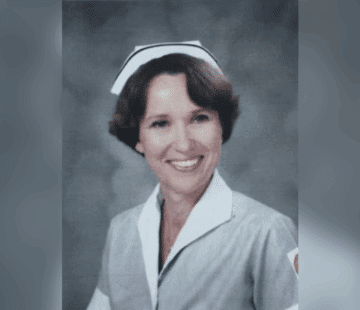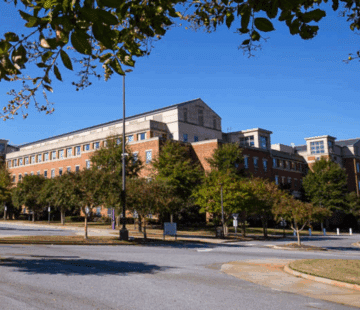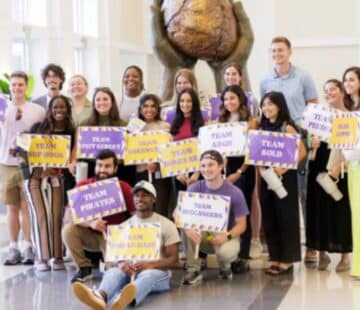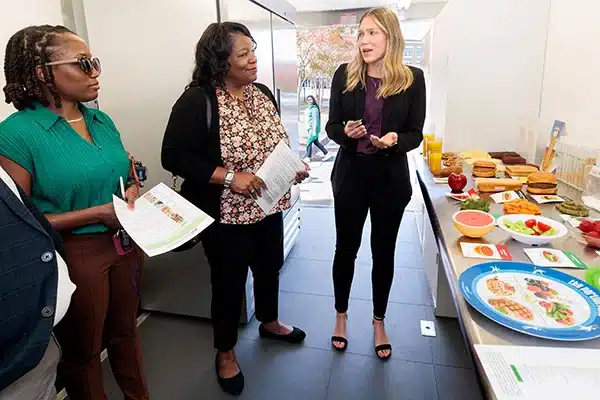Mike Sheppard was a part-time drummer, keeping the beat to his band’s classic rock tunes during gigs in and around his hometown of Canton, North Carolina.
But that musical rhythm was interrupted by a different kind of tempo — the throbbing pain that he almost constantly felt in his teeth and mouth. That’s when Sheppard had to set down his drumsticks.
He sought help at the East Carolina University School of Dental Medicine’s community service learning center (CSLC) in Sylva, where he received care during the school’s ECU Smiles for Veterans event in December.
“It’s been life-changing,” Sheppard said.
He and more than 100,000 patients have received care through the School of Dental Medicine’s on-campus and hospital clinics, CSLCs and community program sites across the state — an achievement that goes well beyond a headcount, but is instead measured by smiles restored.
“Celebrating this milestone is not just about a number,” said Dr. Greg Chadwick, dean of the ECU School of Dental Medicine. “It is about educating the next generation of dentists as we provided much needed care to 100,000 North Carolinians, many of whom may not have had access to this care if it were not for our community service learning centers across the state and our supporters and donors who have been there from the beginning.”
The School of Dental Medicine opened its doors to students in 2011, driven by a mission of preparing dentist leaders and increasing access to oral health care for patients across the state, especially in rural and underserved communities. Since 2012, the school’s model has expanded through the creation of the CSLCs and innovative programming that reaches more patients where they are.
“This is a landmark moment for ECU and the School of Dental Medicine,” said ECU Chancellor Philip Rogers. “This is not only a milestone, but also a mile marker, as we are just getting started. It is a reminder that we are upholding a promise we made to the people of our state to prepare new dentist leaders and increase access to oral health care for patients everywhere, including our most rural communities.”
Over the course of his visits to the CSLC-Sylva, Sheppard received partial dentures and repairs to cracked and broken teeth. The difference, he said, has been evident in daily life.
“Before, I was in lots of pain; at least two or three days a week I’d be functioning with really bad pain,” he said. “Now, I feel 100% better than I did.”
Sheppard has also returned to his music.
“Since last year, we’ve done seven gigs that I hadn’t done for years before because of the pain,” he said. “I can do this again and not have to worry about the pain and embarrassment. If affects the way you perform. When you can smile and you couldn’t before, it’s confidence — and confidence can lead to other things.”
‘A mutually beneficial setting’
“When I first heard ECU School of Dental Medicine has treated 100,000 across the state, my first response was, ‘Wow!’ This accomplishment is incredibly impactful to all of North Carolina, and knowing I was a small part in that, is very special,” said Dr. Jennifer Vrikkis ’16, who practices at Reynolda Smiles Family Dentistry in Winston-Salem. “I can’t believe it’s been several years since leaving formal education and starting my journey in private practice, but I still feel like I’m a part of ECU with the same mission to serve our community.”
An important piece of the school’s model is recruiting and educating students who have shown the desire to make a difference for North Carolina through dentistry. These students and alumni come from all over the state, bringing with them a passion for caring for others through creative and daring initiatives.
Close to 90% of ECU School of Dental Medicine graduates practice in North Carolina, a number that could be impacted by the school’s unique model of care. During their fourth year, students gain experience at three of the school’s eight CSLCs across the state, as well as clinics in Ross Hall, the school’s campus facility.
That model not only provides a wider variety of clinical experiences for students, but more opportunities for patients to receive care.
Dr. Robert Pinner ’21 runs Pinner Family Dental in Greenville and considers the latest milestone a win for students and alumni from the school’s first days.
“Though I’m just a small link in a long chain of participants, it gives me tremendous satisfaction to see all we have collectively accomplished,” Pinner said. “This mutually beneficial treatment and learning setting—and the doubly positive outcomes it provides—is really the overlooked ‘secret sauce’ that sets our students apart. Upon graduating, our students are ready and prepared to go practice dentistry at a high level. Building this model was intentional and took a great deal of forethought and diligence.”
Dr. Roopwant Kaur, assistant dean for engagement and clinical associate professor of operative dentistry, said the milestone is a testament to the school’s commitment to delivering care based on a proactive and assertive approach, “demonstrating commitment to pioneering and innovative strategies in addressing complex health care challenges.
“This remarkable accomplishment serves as a shining example of our unparalleled success in balancing our core educational mission, impactful community service initiatives and unwavering dedication to clinical excellence,” she said.
Dr. Jasper Lewis Jr., a Greenville pediatric dentist who supported and guided the dental school’s creation, said the school is going beyond the mission and vision it was first founded to achieve.
“Our students are exposed to the same curriculum as other schools, but in a model that gives them a broader exposure to dental needs of all types of patients from a large variety of educational and financial backgrounds across the state,” said Lewis, also the namesake of the school’s first endowed professorship. “Students are taught not only the didactics and mechanics of dentistry, but how to be efficient for the patients as well as themselves. This helps them to see more patients in a given time at less expense to both the patient as well as the provider.”
The mountains-to-coast approach
The state motto of North Carolina is a poignant yet bold call “to be, rather than to seem.” ‘To seem’ is stationary. ‘To be’ is a journey, a calling.
The School of Dental Medicine’s mission has long been less about words and more about works — finding ways to tangibly reach more patients while preparing dentist leaders eager to care for a state that needs them. The school is built on a combination of hope, grit and determination that intersect at a crossroads of better health and better lives.
“Over the years, our students have not only learned to care for the patients they interact with, but they have also nurtured their inherent desire to serve,” said Dr. Margaret Wilson, vice dean and interim associate dean for student affairs. “Our students and alumni are living and working our mission, and their hard work shines through this meaningful milestone. Each of them has left a mark on our school, and in turn, on the patients they care for and in the communities where they make a difference.”
The CSLC system, an award-winning model that includes centers in Ahoskie, Brunswick County, Davidson County, Elizabeth City, Lillington, Robeson County, Spruce Pine and Sylva, each sprung from roots carefully cultivated in their communities spanning regions, demographics and distinctive needs. These centers serve as the school’s “secret weapon” against the challenges North Carolina faces in oral health care — aging dentists, remote locations, lack of insurance or means of funding care and other challenges specific to communities, families and patients.
“Seeing the plan unfold from the perspective of the community service learning center has been an enriching experience,” said Dr. Ford Grant, faculty director of the CSLC-Ahoskie. “From my pre-ECU perspective, it is remarkable that 100,000 patients have been cared for since the first patient was seen in Ahoskie in July 2012. How would these patients have received care without the school? It is a humbling thought as we celebrate this milestone.”
Grant said the number also signifies that there is a long way to go still.
“So many more of our North Carolina citizens still have access to care issues,” he said. “The main campus at Ross Hall and the rural-based community service learning centers can only meet some of the unmet dental needs of the state. ECU’s model is in a great position to support dentists in rural locations through continuing education and community service projects. Being involved in underserved areas can help lift up communities by providing much-needed dental care and has encouraged young people in rural areas to seek careers in the health professions. We hope our staff, students and faculty interacting within the community continue to help inspire others.”
Caring for special populations
When Bruce Hair started having dental issues, he stopped talking. He didn’t want to meet new people or be put in a position to hear jokes or ridicule.
Hair, of Franklin, North Carolina, had dealt with a broken front tooth for more than a year when he sought help at the CSLC-Sylva through ECU Smiles for Veterans.
“I am so happy with the outcome,” Hair said. “When I was missing that whole front tooth, I was uncomfortable around strangers and anywhere for that matter. I just let it get to me in a personal sense. I had stopped smiling; my life was just kind of closing in.”
These days, he can be himself again.
“Now that I can smile and look at people and talk in a normal way, I’m just a lot happier,” Hair said.
Hair and other patients who are considered part of special populations — veterans, children, the elderly, those with special care needs — have found more accessible oral health care thanks to the school’s programs focused especially on them.
In addition to ECU Smiles for Veterans, the school offers the Sonríe Clinic for migrant farmworkers, school-based dental programs in Bertie and Jones counties and a monthly clinic in Hyde County, among other volunteer and outreach programs. Since 2020, the school-based programs alone have provided more than 12,000 preventive and diagnostic services to over 1,000 children in Bertie and Jones counties who have extremely limited access to care, said Rachel Stewart, supervisor of school-based oral health prevention programs for the School of Dental Medicine.
“Being on the front lines of these programs is an amazing opportunity to connect with patients and community members,” Stewart said. “By staying immersed in the community, we can see the changes as they happen and connect with community members and leaders to learn how to best serve the children of the county. Not only do the programs provide clinical services, but we also provide oral health education and supplies to each child.”
Third-year dental students develop age-appropriate presentations that they present in each county as well, improving the oral health literacy of the children while also helping the dental students develop their passion for working in underserved communities.
Faculty and student research also leads to reaching more patients and finding more innovative ways to care for them; the school’s research base is expanding and taking advantage of resources, grants and partnerships across the state and nation. Special needs care capabilities are also expanding through state allocations and other funding.
The growth in these areas keeps some students confident that their ECU School of Dental Medicine experience is preparing them to care for the next 100,000 patients.
“Being a part of the school has been an inspiring journey,” said fourth-year dental student Cherina Jo McKnight. “I knew that committing to this school would teach me the keys to unlock many doors closed to underserved populations. I believe that one of the most rewarding aspects of becoming a dentist is making a difference in someone’s life while doing something I truly love.”
Chadwick said the momentum is building for the school’s most fruitful years to come.
“Each of these 100,000 patients is a North Carolinian, a part of our dental school community and a face that represents our mission and vision,” he said. “We are grateful to them for entrusting their care to us — and we look forward to restoring and creating even more smiles across the state as we enter the next chapter in the life of our school.”
When East Carolina University’s new Farm 2 Clinic (F2C) mobile teaching kitchen and pantry hits the road it will deliver more than nutrition to underserved people in the region. The 28-foot trailer, wrapped in bold purple, with imagery of colorful produce and program logos, also carries the university’s values.
“I am struck by how this is a mobile billboard for ECU’s mission of student success, public service and regional transformation,” said Christopher Dyba, vice chancellor of university advancement. “I cannot help but have a bit of awe seeing this and want to take a moment to say how impressive and beautiful this is.”
The mobile teaching kitchen and pantry launched Tuesday at a ribbon cutting and celebration at the College of Allied Health Sciences. Through its hunger-relief platform, Food Lion Feeds, Food Lion invested $150,000 in ECU’s innovative F2C initiative to make the trailer possible.
“Today’s event celebrates a longtime and meaningful corporate partnership with Food Lion,” Dyba said. “Together, we share an important commitment to ending hunger and addressing health disparities in our local communities.”
Dyba also recognized Duke Endowment, which provided programmatic support for the Department of Nutrition Science to manage the Fresh Start program, and Camping World and Signsmith for their efforts to outfit and design the trailer.
Through the Food Lion partnership, the mobile teaching kitchen and pantry is equipped with two commercial refrigerators, shelving, sinks, spaces for food preparation and cooking, and extensive storage for educational supplies. At the ribbon cutting, the trailer also was loaded with hundreds of pounds of fresh produce donated by Food Lion. The produce will be provided to patients at the Pitt County Care Clinic, run by Dr. Tom Irons, and the Hope Clinic in Bayboro.
The mobile teaching kitchen and pantry is designed to improve access to healthy food and support improved nutrition and health for uninsured, low-income diabetes patients in rural eastern North Carolina. The program provides nutrition science students experience as they guide patient participants to learn food skills while enabling them to provide fresh, local produce to patients directly.
David Garris, director of operations with Food Lion, said the company supports ECU’s Farm 2 Clinic initiative because of its transformative approach to addressing food insecurity.
“We applaud ECU and the work you’re doing. We’re honored to be a part of and support your mobile teaching kitchen and pantry,” Garris said. “Now more than ever, unique approaches and collaborative partnerships, like the one we have with East Carolina University, are needed to address food insecurity. Together, we are meeting our community’s needs by increasing access to fresh and nutritious food and addressing the root causes of hunger.”
The partnership with ECU carries a personal element of pride for Garris, who describes himself as loyal and bold, purple and gold.
“To say that I am proud of East Carolina might be an understatement. I am incredibly proud to support their efforts. As a former student of East Carolina University, where I studied music education, I was a proud Marching Pirate and have always felt a sense of belonging,” Garris said. “We love this university, and even more so, we love what this university means and does for eastern North Carolina.”
Dr. Michael Wheeler, chair of the nutrition science department, described the new mobile kitchen as a celebration of three Ps — the right people, project and partnership
The idea of a program to take nutrition science into the field was discussed for years within the department. He said it became reality when Dr. Lauren Sastre, assistant professor and founder and director of the F2C initiative, created the project. Sastre and F2C graduate students leaders recruited more student volunteers to implement the program. By establishing partnerships in the community more people became involved and supported the initiative.
At Hope Clinic in rural Pamlico County, Executive Director Yolanda Cristiani and staff provide primary health care to low-income, uninsured adults. Cristiani heard a presentation on ECU’s Fresh Start program and applied to participate.
“From the health coaching to the diabetes education and exercise, and the nutrition aspect, this program exceeded my expectations,” she said. “One (program graduate) lost a considerable amount of weight, gained confidence, got a job, and now we see him outside the grocery store he now works in, swinging a kettle ball on his breaks. This has really changed his life in a lot of ways.”
Cristiani said she sees many positive results of the Fresh Start program in her community. Patients have included their family members and shared the lifestyle changes and nutrition lessons at home. She said the addition of a mobile teaching kitchen and pantry will significantly boost their support of marginalized communities.
Brandon Stroud ’21 ’23, F2C’s assistant director, is completing his dietetic internship with ECU and plans to be a registered dietitian. His career path has been influenced by working in the community with Fresh Start and watching F2C grow.
“This program was my first exposure to community-engaged nutrition research and programming and changed my career trajectory as I want to continue to find innovative ways to work in and serve eastern North Carolina,” Stroud said. “One highlight for me was a patient whose blood sugar was so high it had started to affect his vision, and he told us that after the program he was able to see better.”
Stroud said much of the program’s success was generated by the involvement of more than 200 students who contributed 200,000 volunteer hours, participated in 23 student research projects, and assisted in developing 14 national peer-reviewed scientific presentations and publishing five peer-reviewed manuscripts.
“We are not only serving eastern North Carolina, we are showing the rest of the United States how to do food and nutrition programming in novel ways,” Stroud said.
Brooke Gillespie ’23, F2C coordinator and a nutrition science graduate student, began as a volunteer with the Fresh Start program in her junior year.
“At that time, I was so beyond excited to get my foot in the door with a program that represented ECU and the eastern North Carolina community. Little did I know, I was stepping into a world that would completely change my life,” Gillespie said.
During her earlier involvement in Fresh Start, Gillespie said Sastre took her under her wing and trusted Gillespie with food preparation and recipe development, vital components that keep the program running. Thanks to Food Lion, she said, program components will be managed with ease using the mobile kitchen.
“I can tell you that our impact is far beyond what numbers can represent. I have been able to watch students go from shy, nervous and unsure of their abilities into being some of the most self-assured, confident and driven future health care professionals,” Gillespie said. “I have listened to patients who have told me how this program has helped them face barriers they never thought they would overcome. I even had a patient tell me how when she started the Fresh Start program she thought that diabetes had control over her life, but now she knows that she has control over her diabetes.”
ECU’s Pursue Gold campaign to raise half a billion dollars will end in December. This ambitious effort will create new paths to success for Pirates on campus, across the country and around the world. Donor gifts during the campaign will keep ECU constantly leading and ready to advance what’s possible. Learn more at ECU’s Pursue Gold.
Fourth-year East Carolina University School of Dental Medicine student William Via’s rotation at the school’s community service learning center (CSLC) in Spruce Pine handed him the opportunity to care for a group of veterans during the center’s inaugural ECU Smiles for Veterans event.
It was an experience he won’t soon forget.
“I never have worked with a more appreciative group of patients that also deserve the most appreciation themselves,” Via said.
While it was the first ECU Smiles for Veterans event at the CSLC–Spruce Pine, the school has hosted events through the program since 2018. It partnered with western North Carolina veterans organizations to host the inaugural program 95 miles southwest of Spruce Pine at the CSLC–Sylva. Prior to the Spruce Pine event, the ECU Smiles for Veterans program had provided more than $125,000 of care to more than 275 veterans.
The program was created to reach veterans who have not had access to dental care in the past, part of the school’s efforts to prioritize special populations within its communities. The event provides preventive care and necessary procedures — from fillings to extractions and more — at no cost to the veterans.
In 2018, school leaders joined forces with local veteran services organizations, NC Serves Western and Smoky Mountains Outreach Foundation — now Veteran Smiles Foundation — which provides education and financial support to veterans in North Carolina who want to improve their oral health. As the program has grown and expanded from Sylva to the CSLC–Brunswick County and those in Lillington and Spruce Pine, the Delta Dental Foundation has also become a sponsor through its mission to expand equity in oral and overall health by partnering with community programs.
The community also pitched in to make the day a success. DT’s Blue Ridge Java offered coffee and refreshments, United Community Bank brought lunch, Image Dental Arts provided some partial dentures and local Robert Bailey delivered laser-edged flags to show appreciation to the veterans.
An ECU Smiles for Veterans Patient Care Fund has also been created to help support the program.
ECU Smiles for Veterans events are held throughout the year, and fourth-year dental students completing one of their nine-week rotations at the school’s eight CSLCs might find themselves in the middle of one of the school’s strongest traditions.
“Within the first week of our arrival to the clinic, the whole staff was meticulously planning the event,” Via said. “It was immediately evident to me that the ECU School of Dental Medicine’s Spruce Pine clinic had a passion to serve our country’s veterans. Their foresight and effort could be seen and felt by every veteran patient that participated in the event.”
During the event in Spruce Pine, faculty, students and residents provided $10,000 worth of care to 15 veterans, supported by an enthusiastic office staff.
“Our veterans are a special group of people. They served our country, and through our Smiles for Veterans Day, we get to serve some of them,” said Gene Self, business services coordinator at the CSLC–Spruce Pine. “It was awesome to hear about their tours of duty and to get to hear their stories. The event strengthened our connection by meeting our mission ‘to serve.’”
Self said the event was made more meaningful by the faculty and staff who made the trip from Ross Hall, the dental school’s campus facility in Greenville, to help provide care.
“Serving patients like these and making a difference in our community is one reason I love working at ECU School of Dental Medicine in Spruce Pine,” he said. “Through our partnership with Veteran Smiles and other community partners, we are able to care for underserved patients and make care more accessible for those who need it. Having a positive influence in the lives of people in our community is one thing that drew me to School of Dental Medicine in the first place.”
Charles F., a veteran who received care during the Spruce Pine event, said the care he received that day is already making an impact.
“It’s going to change my life; I can actually smile now,” he said, detailing the procedures he had completed. “I’ve been trying to get care for my teeth for over two years. This is a lot of work, and I’m so thankful for it.”
Via said participating in the event was an experience he will carry with him as he cares for future patients.
“Every patient had an individual story that fit into a collective love and appreciation for our country. I am so thankful to have been a part of that service day. When a service event goes so well, it makes me ready for the next opportunity to do even more.”
He said the event was also unique because many of the school’s faculty who lead the ECU Smiles for Veterans events are veterans themselves who are also active in carrying out the school’s mission of opening doors to dental care across the state.
“Having faculty and administrators that have dedicated their careers to service through the Armed Forces brings an excitement that is hard to describe,” he said. “The service events that the school is able to hold emphasizes the immense need in North Carolina communities, a need that ECU School of Dental Medicine works so very hard to meet.”
The East Carolina University School of Dental Medicine is able to support more rural underserved North Carolinians with dental care needs thanks to a first-time gift from The Leon Levine Foundation.
Through the $60,000 gift, supporting the patient care funds program, more patients can receive care at the SoDM’s community service learning centers (CLSCs) and clinics throughout North Carolina. Patients who qualify are able to get low-cost dental procedures and preventive care through the program.
“We are honored to receive support from The Leon Levine Foundation as we work to fulfill our mission of serving the people of North Carolina,” said Dr. Greg Chadwick, dean of the ECU School of Dental Medicine. “Generous grants in support of patient care funds allow us to serve even more patients in rural and underserved communities through our CSLCs. We are also better able to provide our students with high-quality educational and clinical experiences and create innovative solutions to the oral health challenges in our region and state.”
For more than a decade, the CSLCs have allowed the dental school to achieve its mission to develop leaders with a passion to care for the underserved and improve the health of North Carolina and the nation. The SoDM has earned national awards for its innovative model of education and patient care.
“We believe that equitable access to quality healthcare – including dental care – enriches the wellbeing of individuals and their families. In light of this, The Leon Levine Foundation is honored to support the patient care funds program through ECU’s School of Dental Medicine,” said Dr. Michael Richardson, senior program officer of healthcare. “These resources directly help underserved and uninsured patients, resulting in healthier communities.”
Richardson said Levine cared deeply about establishing pathways from poverty to self-sufficiency. Providing access to affordable treatment through the CSLCs allows patients to face one less barrier to economic mobility.
“While North Carolina has faced a shortage of dentists in recent years, especially in rural communities, we are confident that ECU’s School of Dental Medicine will positively impact dental care trends in the region in the years to come,” Richardson added.
Fourth-year dental students spend three nine-week sessions serving in CSLCs across the state, living and working in communities whose residents face a plethora of disparities, from financial hardships to geographical access.
The Leon Levine Foundation supports programs and organizations that improve the human condition through investments in education, healthcare, human services and Jewish values. Based in Charlotte, the foundation invests in nonprofits across North Carolina and South Carolina with strong leadership, a track record of success, and a plan for financial sustainability. Through its investments, the foundation intends to create pathways to self-sufficiency, champion strategies for permanent change, and facilitate opportunities for growth.
ECU is in the public phase of the Pursue Gold campaign to raise half a billion dollars. This ambitious effort will create new paths to success for Pirates on campus, across the country and around the world. Donor gifts during the campaign will keep us constantly leading and ready to advance what’s possible. Learn more at pursuegold.ecu.edu.







